This article was co-authored by Karina Klimtchuk, L.Ac., DACM, Dipl. OM. Dr. Karina Klimtchuk is a Licensed Acupuncturist, Diplomate of Oriental Medicine, Faculty Member at Yo San University of Traditional Chinese Medicine, and the Owner of Kai Wellness. She specializes in holistic health, Chinese herbal medicine, and functional medicine. Dr. Klimtchuk also helps patients through emotional and spiritual trauma. She holds a BA in Psychology and Sociology from The University of Massachusetts, Boston, a Master's from Emperor's College in Santa Monica, CA, and a Doctorate of Acupuncture and Chinese Medicine (DACM) from Pacific College of Oriental Medicine.
There are 11 references cited in this article, which can be found at the bottom of the page.
This article has been viewed 80,081 times.
Essential oils can help relax your body and mind, and they may help alleviate stress and anxiety. If you have questions about using them topically, we're here to help!
Steps
Expert Q&A
-
QuestionWhat is the best essential oil for anti aging?
 Lorena BarcalLorena Barcal is a Clinical Herbalist, Clean Beauty Specialist, and Writer for IslandBeauty.co, a blog dedicated to sharing the benefits of using all-natural beauty products and recipes created by herbalists. Lorena specializes in studying and developing natural alternatives for beauty products. After finishing her herbal studies, Lorena managed an herbal lab in Barcelona developing natural beauty products. As a writer for IslandBeauty.co, she shares knowledge and insights to promote the natural beauty industry.
Lorena BarcalLorena Barcal is a Clinical Herbalist, Clean Beauty Specialist, and Writer for IslandBeauty.co, a blog dedicated to sharing the benefits of using all-natural beauty products and recipes created by herbalists. Lorena specializes in studying and developing natural alternatives for beauty products. After finishing her herbal studies, Lorena managed an herbal lab in Barcelona developing natural beauty products. As a writer for IslandBeauty.co, she shares knowledge and insights to promote the natural beauty industry.
Clinical Herbalist & Clean Beauty Specialist Give pomegranate seed oil a try! This great essential oil has anti-aging properties.
Give pomegranate seed oil a try! This great essential oil has anti-aging properties. -
QuestionWhat essential oil helps with irritated skin?
 Lorena BarcalLorena Barcal is a Clinical Herbalist, Clean Beauty Specialist, and Writer for IslandBeauty.co, a blog dedicated to sharing the benefits of using all-natural beauty products and recipes created by herbalists. Lorena specializes in studying and developing natural alternatives for beauty products. After finishing her herbal studies, Lorena managed an herbal lab in Barcelona developing natural beauty products. As a writer for IslandBeauty.co, she shares knowledge and insights to promote the natural beauty industry.
Lorena BarcalLorena Barcal is a Clinical Herbalist, Clean Beauty Specialist, and Writer for IslandBeauty.co, a blog dedicated to sharing the benefits of using all-natural beauty products and recipes created by herbalists. Lorena specializes in studying and developing natural alternatives for beauty products. After finishing her herbal studies, Lorena managed an herbal lab in Barcelona developing natural beauty products. As a writer for IslandBeauty.co, she shares knowledge and insights to promote the natural beauty industry.
Clinical Herbalist & Clean Beauty Specialist Cedarwood oil can help reduce irritation. If your skin is really inflamed, give rosemary or tea tree oil a try.
Cedarwood oil can help reduce irritation. If your skin is really inflamed, give rosemary or tea tree oil a try. -
QuestionWhat essential oil is good for face cleansing?
 Lorena BarcalLorena Barcal is a Clinical Herbalist, Clean Beauty Specialist, and Writer for IslandBeauty.co, a blog dedicated to sharing the benefits of using all-natural beauty products and recipes created by herbalists. Lorena specializes in studying and developing natural alternatives for beauty products. After finishing her herbal studies, Lorena managed an herbal lab in Barcelona developing natural beauty products. As a writer for IslandBeauty.co, she shares knowledge and insights to promote the natural beauty industry.
Lorena BarcalLorena Barcal is a Clinical Herbalist, Clean Beauty Specialist, and Writer for IslandBeauty.co, a blog dedicated to sharing the benefits of using all-natural beauty products and recipes created by herbalists. Lorena specializes in studying and developing natural alternatives for beauty products. After finishing her herbal studies, Lorena managed an herbal lab in Barcelona developing natural beauty products. As a writer for IslandBeauty.co, she shares knowledge and insights to promote the natural beauty industry.
Clinical Herbalist & Clean Beauty Specialist Ylang ylang essential oil can be used as an effective cleanser for your skin.
Ylang ylang essential oil can be used as an effective cleanser for your skin.
References
- ↑ https://www.takingcharge.csh.umn.edu/how-do-i-choose-and-use-essential-oils
- ↑ https://www.takingcharge.csh.umn.edu/how-do-i-choose-and-use-essential-oils
- ↑ Lorena Barcal. Clinical Herbalist & Clean Beauty Specialist. Expert Interview. 28 June 2020.
- ↑ https://www.health.com/condition/stress/essential-oil-mistakes
- ↑ https://www.sciencedirect.com/topics/agricultural-and-biological-sciences/coconut-oil
- ↑ https://www.eatbydate.com/other/condiments/how-long-does-coconut-oil-last/
- ↑ Karina Klimtchuk, L.Ac., DACM, Dipl. OM. Licensed Acupuncturist & Diplomate of Oriental Medicine. Expert Interview. 25 August 2021.
- ↑ https://wexnermedical.osu.edu/blog/essential-oils
- ↑ https://media.doterra.com/us/en/ebooks/topical-use.pdf
- ↑ https://media.doterra.com/us/en/ebooks/topical-use.pdf
- ↑ Lorena Barcal. Clinical Herbalist & Clean Beauty Specialist. Expert Interview. 28 June 2020.
- ↑ Lorena Barcal. Clinical Herbalist & Clean Beauty Specialist. Expert Interview. 28 June 2020.
- ↑ Karina Klimtchuk, L.Ac., DACM, Dipl. OM. Licensed Acupuncturist & Diplomate of Oriental Medicine. Expert Interview. 25 August 2021.
- ↑ https://www.takingcharge.csh.umn.edu/how-do-i-choose-and-use-essential-oils
- ↑ https://healthywa.wa.gov.au/Articles/A_E/Essential-oils
- ↑ https://www.niehs.nih.gov/health/topics/agents/essential-oils/index.cfm
- ↑ https://achs.edu/blog/2017/08/15/aromatherapy-essential-oil-dangers-and-safety/
About This Article
To use an essential oil on your skin, first mix it with a carrier oil, like avocado or olive oil, since applying an undiluted essential oil to your skin can cause irritation. Mix about 12 drops of essential oil into 30 milliliters of your carrier oil. Then, apply 1-2 drops of the mixture to the inside of your wrist to make sure you don’t react to it. If you don’t have a reaction after a few hours, rub the oil sparingly on your skin using your fingertips. Target areas like your face and chest to increase circulation. Be sure to avoid your eyes and mouth so you don’t irritate them. For tips about how to add essential oils to your bath, read on!

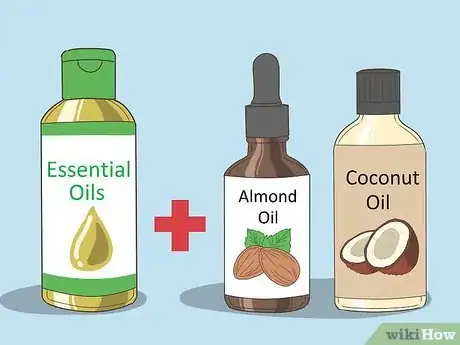

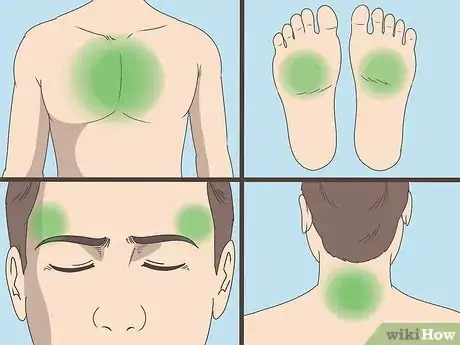

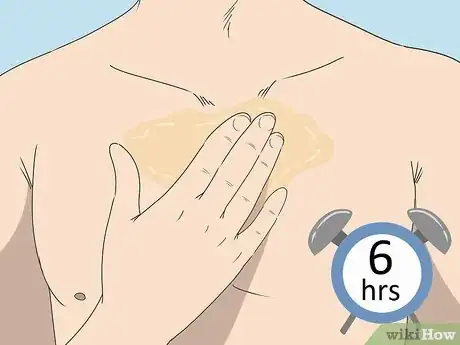
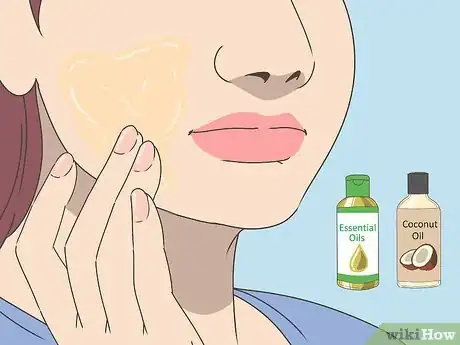
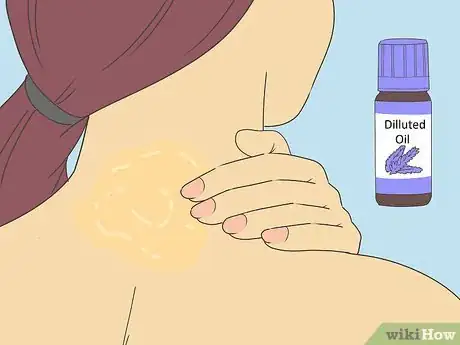
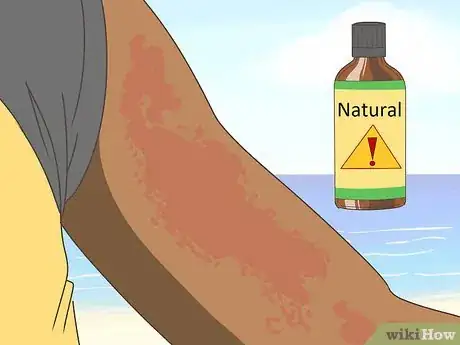
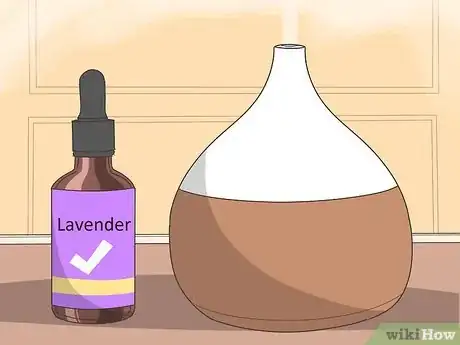


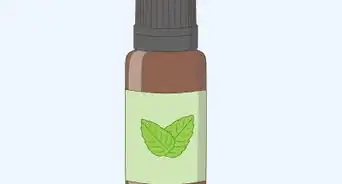
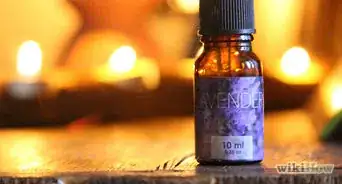


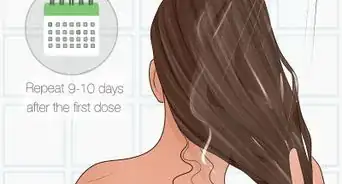


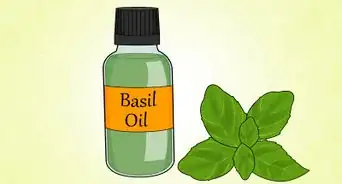










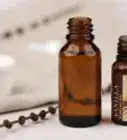
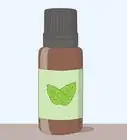



































Medical Disclaimer
The content of this article is not intended to be a substitute for professional medical advice, examination, diagnosis, or treatment. You should always contact your doctor or other qualified healthcare professional before starting, changing, or stopping any kind of health treatment.
Read More...